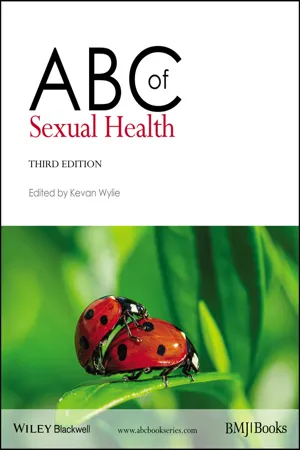
- English
- ePUB (mobile friendly)
- Available on iOS & Android
ABC of Sexual Health
About this book
ABC of Sexual Health provides a comprehensive overview of this important, but difficult subject and includes reading resources as well as information on professional societies, patient groups and online resources.
Fully revised and expanded to cover a range of new content and topics including psychological, urological, gynaecological, endocrinological and psychiatric aspects of sexual health, the effects of medication, sexual dysfunction, sexual orientation, gender identity, paraphilias, forensic sexology, dermatoses, and psychosexual therapy and education.
ABC of Sexual Health is a practical guide for all general practitioners, family physicians, trainees and medical students wanting to improve communicating, examining and managing patients with sexual health problems.
About the ABC series
The new ABC series has been thoroughly updated, offering a fresh look, layout and features throughout, helping you to access information and deliver the best patient care.The newly designed books remain an essential reference tool for GPs, GP registrars, junior doctors and those in primary care, designed to address the concerns of general practitioners and provide effective study aids for doctors in training.
Now offering over 70 titles, this extensive series provides you with a quick and dependable reference on a range of topics in all the major specialities. Each book in the new series now offers links to further information and articles, and a new dedicated website provides you with even more support.
The ABC series is the essential and dependable source of up-to-date information for all practitioners and students in general practice.
To receive automatic updates on books and journals in your specialty, join our email list. Sign up today at www.wiley.com/email
Frequently asked questions
- Essential is ideal for learners and professionals who enjoy exploring a wide range of subjects. Access the Essential Library with 800,000+ trusted titles and best-sellers across business, personal growth, and the humanities. Includes unlimited reading time and Standard Read Aloud voice.
- Complete: Perfect for advanced learners and researchers needing full, unrestricted access. Unlock 1.4M+ books across hundreds of subjects, including academic and specialized titles. The Complete Plan also includes advanced features like Premium Read Aloud and Research Assistant.
Please note we cannot support devices running on iOS 13 and Android 7 or earlier. Learn more about using the app.
Information
Chapter 1
Psychosexual Development
Overview
- Psychosexual development is not limited to childhood and adolescence but extends through adult life
- Early psychoanalytic views of the process are still influential but more recent ideas such as consumerist and feminist perspectives offer a more societal emphasis
- It is important to consider the impact of the aspects of law and culture that relate to psychosexual development
- Clinicians need to be aware of the implications of these issues and the various factors impacting on development in their consultations with patients.
Introduction
Psychoanalytic views
| Oral stage 0–2 years Desires are focussed on the lips and mouth. The mother becomes the first love-object, a displacement from the earliest object of desire, the breast |
| Anal stage 2–4 years of age In this stage, the anus is the new auto-erotic object with pleasure being obtained from controlling bladder and bowel movement |
| Phallic stage 4–7 years of age In this third stage, awareness of and touching the genitals is the primary source of pleasure |
| Latency period 7–12 years of age During this time, sexual development is more or less suspended and sexual urges are repressed |
| Genital phase 13 years + (or from puberty on) In this final phase, sexual urges are direct onto opposite sex peers with the primary focus of pleasure of the genitals |
Consumerist view
Feminist views
Definition of childhood and adolescence
The impact of law and culture
Table of contents
- Cover
- Series Page
- Title Page
- Copyright
- Table of Contents
- Series Foreword
- Contributors
- Chapter 1: Psychosexual Development
- Chapter 2: Physical Aspects of Sexual Development
- Chapter 3: Anatomy and Physiology in the Male
- Chapter 4: Anatomy and Physiology in the Female
- Chapter 5: The Sexual History and Formulation
- Chapter 6: The Clinical Examination of Men and Women
- Chapter 7: Male Dermatoses
- Chapter 8: Female Dermatoses
- Chapter 9: Investigation and Management of Endocrine Disorders Affecting Sexuality
- Chapter 10: Investigations in Sexual Medicine for Women and Men with Sexual Health Problems
- Chapter 11: Definition and Diagnosis of Sexual Problems
- Chapter 12: Psychiatric Disorders and Sexuality (Including Trauma and Abuse)
- Chapter 13: Medication and Sexual Dysfunction
- Chapter 14: Problems of Sexual Desire in Men
- Chapter 15: Problems of Sexual Desire and Arousal in Women
- Chapter 16: Erectile Dysfunction
- Chapter 17: Problems of Ejaculation and Orgasm in the Male
- Chapter 18: Problems of Orgasm in the Female
- Chapter 19: Sexual Pain Disorders – Male and Female
- Chapter 20: Ageing and Sexuality
- Chapter 21: Paraphilia Behaviour and Disorders
- Chapter 22: Impulsive/Compulsive Sexual Behaviour
- Chapter 23: Forensic Sexology
- Chapter 24: Ethnic and Cultural Aspects of Sexuality
- Chapter 25: Concerns Arising from Sexual Orientation, Practices and Behaviours
- Chapter 26: Gender Dysphoria and Transgender Health
- Chapter 27: Psychosexual Therapy and Couples Therapy
- Chapter 28: Bibliotherapy and Internet-based Programmes for Sexual Problems
- Chapter 29: Sexual Pleasure
- Index
- Advertisement
- End User License Agreement